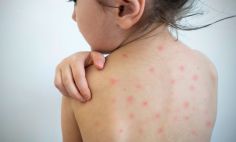The measles mumps rubella (MMR) vaccine is one of the most effective around. It is 97% effective against the viruses when two doses are given.
But Diane Griffin, M.D., Ph.D., a researcher at Johns Hopkins University's Center for Global Health, is working to improve that already high rate for this and other vaccines.
She's doing that by studying the measles virus, with help from NIH's National Institute of Allergy and Infectious Diseases.
Lifelong immunity
Dr. Griffin and her team want to understand how people who've had measles are protected from the virus for the rest of their lives.
"If you get measles when you're 6, you're still immune to it at 85," Dr. Griffin says. "That is something that a lot of vaccines would like to accomplish."
They're looking at the vaccine and the actual virus side by side to better understand this.
Dr. Griffin cautions that while immunity can lessen over time in vaccines like MMR, it's still high enough to protect most people for life. Her research wants to close that already narrow gap.
All in the antibodies?
As part of their research, Dr. Griffin's team is studying antibody production.
Antibodies are proteins in our blood that fight off infection and disease. More antibody production against a virus like measles means better immunity or protection.
By researching antibody production against the measles virus, Dr. Griffin and her team want to see if they can identify which genes help make the antibodies better.
Once they identify those genes, they can work to improve antibody production by the vaccine to provide similar lifelong immunity.
Reducing complications
One of the main reasons behind Dr. Griffin's work to improve vaccines is to stop potential complications that come with diseases like measles.
"The natural disease is a nasty one," Dr. Griffin notes.
Most people with measles are sick for about a week. But it actually takes months or years for peoples' bodies to clear the virus and completely recover.
While that helps give them strong immunity from getting the virus again, it can also be dangerous. Some patients can have long-term symptoms or complications, leading to serious health issues.
"Other infections like bacterial pneumonia are quite common after measles," Dr. Griffin adds.
"This is why access to medical care makes such a big difference," Dr. Griffin says. "Most people who die of measles die of related infections, usually a month or two after having measles."
A particularly serious complication is postinfectious encephalomyelitis, which is rare, but can cause seizures and brain damage that lasts for years after a case of the measles.
As Dr. Griffin works to improve future vaccine immunity, she says that current vaccines are essential for staying healthy and keeping others healthy.
"We have to keep the rate of immunity greater than 90% in order to prevent outbreaks and protect those who can't get vaccinated," she adds.






